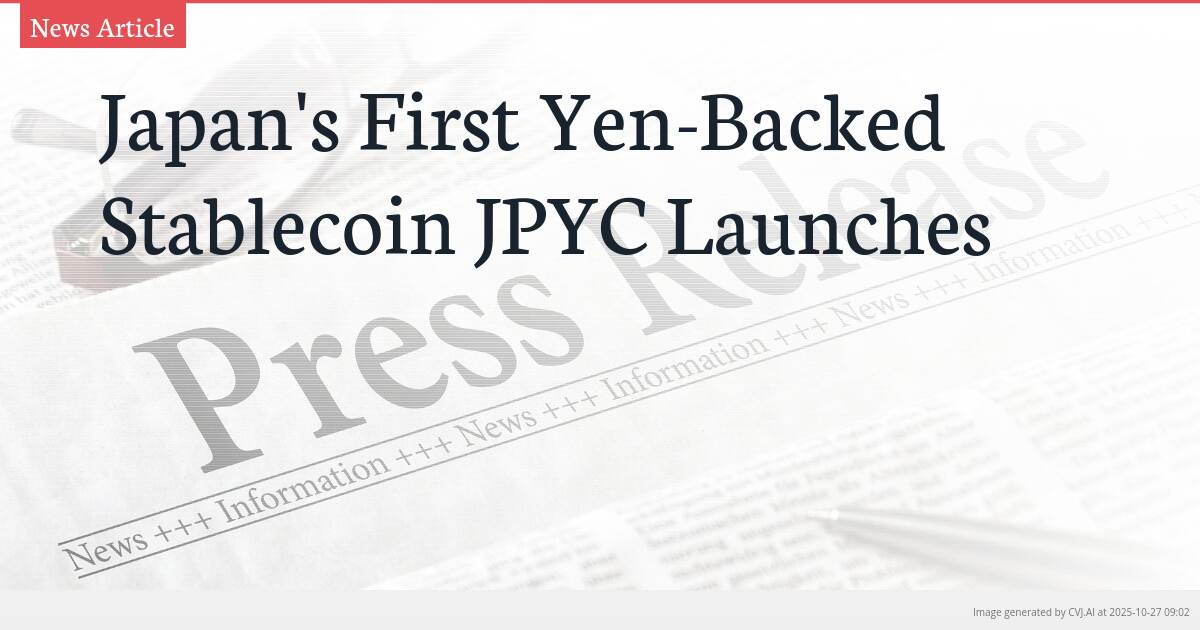This summary text is fully AI-generated and may therefore contain errors or be incomplete.
Introduction
Tokyo-based fintech firm JPYC has launched Japan’s first yen-backed stablecoin, marking a significant milestone in the country’s digital currency landscape. The new stablecoin, which went live on Monday, is fully backed by bank deposits and government bonds with a 1:1 exchange rate to the Japanese yen, positioning Japan firmly in the global race for stablecoin market dominance.
Key Points
- First yen-backed stablecoin launched in Japan with full regulatory compliance
- Backed 1:1 by bank deposits and government bonds for maximum stability
- Already attracted interest from seven companies planning integration into their services
A Historic Milestone for Japanese Currency
JPYC President Noriyoshi Okabe declared the stablecoin’s launch a “major milestone in the history of Japanese currency” during a press conference in Tokyo. This announcement, reported by Business Insider Japan, represents Japan’s entry into the competitive stablecoin arena with a fully regulated, yen-pegged digital asset. The timing is strategic, coming amid growing global competition to establish dominance in the rapidly expanding stablecoin market.
The JPYC stablecoin distinguishes itself through its robust backing mechanism, being fully collateralized by bank deposits and government bonds. This 1:1 backing with traditional financial instruments provides a level of stability and security that sets it apart from many other digital currencies. The company’s commitment to maintaining a perfect 1:1 exchange rate with the Japanese yen ensures that users can trust the stablecoin’s value preservation, making it particularly attractive for both individual and institutional investors seeking exposure to digital assets without the volatility typically associated with cryptocurrencies.
Strong Early Market Interest and Adoption Potential
According to President Noriyoshi Okabe, the JPYC stablecoin has already generated significant interest from the business community, with seven companies expressing plans to incorporate the digital currency into their services. This early adoption signal demonstrates the market’s readiness for yen-denominated stablecoin solutions and suggests strong potential for rapid ecosystem development around the new digital asset.
The interest from multiple companies across different sectors indicates that JPYC is being viewed as more than just a technological innovation—it’s being recognized as a practical financial tool that can enhance existing services and create new business opportunities. This early validation from the market is crucial for establishing network effects and building the critical mass needed for long-term success in the competitive stablecoin landscape.
Positioning in the Global Stablecoin Race
Japan’s entry into the stablecoin market through JPYC comes at a pivotal moment in the global digital currency race. With countries and corporations worldwide developing their own stablecoin solutions, Japan’s approach—combining traditional financial safeguards with blockchain innovation—represents a distinctive strategy that could appeal to risk-averse markets and regulated financial environments.
The JPYC platform not only issues the stablecoin but provides the necessary infrastructure for its widespread adoption. This comprehensive approach addresses one of the key challenges in stablecoin deployment: creating an ecosystem that supports seamless integration and usage. By offering both the currency and the platform, JPYC positions itself as a complete solution provider rather than just a currency issuer, potentially giving it a competitive edge in the crowded marketplace.
The backing by bank deposits and government bonds provides JPYC with a level of credibility and trust that purely algorithmic or crypto-collateralized stablecoins often lack. This traditional financial foundation, combined with blockchain efficiency, creates a compelling value proposition that could accelerate adoption both within Japan and potentially in international markets seeking exposure to yen-denominated digital assets.
📎 Read the original article on cointelegraph.com

